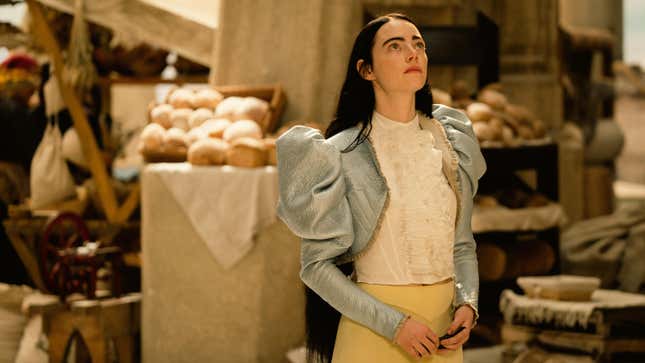
Director Yorgos Lanthimos (The Lobster, The Killing Of A Sacred Deer) is not what one might call a conventional filmmaker, crafting his films with deadpan line delivery that enhances the surreal quality of their premises to lay bare fundamental truths of the human experience. His previous collaboration with screenwriter Tony McNamara, The Favourite, was perhaps as grounded as Lanthimos gets, but his penchant for distorted wide angles and understanding complicated, hopelessly entangled relationships made the film a highlight of his filmography. Now the creative duo have reunited for an adaptation of Alasdair Gray’s superb 1992 novel Poor Things, resulting in a film that is simultaneously Lanthimos’ strangest—no small feat in its own right—but also perhaps his most humanist.
Poor Things follows the exploits and mental evolution of Bella Baxter (Emma Stone), a reanimated corpse of a woman with the mind of a child, brought to life by the emotionally and literally scarred Dr. Godwin Baxter (Willem Dafoe). Godwin (unsubtly nicknamed “God”) invites one of his students, Max McCandles (Ramy Youssef) to take detailed notes on Bella’s growing cognitive processes, eventually prompting McCandles to propose marriage to the infantile ward in a proxy for Godwin’s growing paternal feelings. However, Bella herself is unwilling to be tied down so soon in her newfound life, running away with the oafish attorney Duncan Wedderburn (Mark Ruffalo) on an adventure to travel the world and, to her increasing delight, experience the wonders of sexual gratification.
Emma Stone’s remarkably nuanced performance is the centerpiece of a film that requires her to maintain layers of meaning simultaneously. Bella is a literal Frankenstein’s monster, an infantilized Victorian woman, a child in her perception of the world, a persistently horny adolescent, and a constantly evolving intellect with measured progress from scene to scene. She’s a tragicomic character who is capable of deeply introspective moments, straight-faced challenges to social mores for women, and farcically exaggerated physical comedy within seconds of one another.
Stone balances these aspects of the character flawlessly to mine the depths of a womanhood that is both internally discovered and societally constrained, a sex-positive girlhood forced into a culture of puritanical adulthood. Ruffalo’s Duncan Wedderburn deserves special mention for his inspired comic timing as a dimwitted patriarchal foil to Bella’s growing independence and sense of self, but this is Stone’s hilariously horny escapade to run, a world made hers with all its feminist philosophizing and absurdist dalliances.
In that regard, Lanthimos holds nothing back in making his version of Victorian Europe into a surreal landscape, mirroring Bella’s birth into a new reality by beckoning us into a world where steampunk silliness and blatant artificiality are an unremarkable norm. What starts with the nonsensical animal hybrid experiments housed in Godwin’s home eventually balloons outward into a world populated with mechanized limbs, skies painted with oversaturated pastels, and theatrically enclosed sets meant to stand in for whole cities. Production designers Shona Heath and James Price achieve gorgeous effects that are no less potent through Robbie Ryan’s characteristically distorted cinematography, and the unease is enhanced by Jerskin Fendrix’s fittingly discordant (if occasionally and purposely intrusive) score.
Poor Things is such a rare combination of talented collaborators working in perfect concert that it’s hard to consider the film anything short of masterful. Witty, heartbreaking, horny, aesthetically rapturous, feminist, and humorous, Lanthimos, McNamara, and Stone bring to life a career-defining character that forces us to laugh at the absurd machinations of a world that makes finding meaning in womanhood at all necessary.
It’s a story about constructed identity and questioned authority, asking who we are when cut free from the conditioning that tells us who we should be in “polite society.” As much as it’s a hilariously absurdist fantasia, it’s a meditation on how we define ourselves, how we create ourselves in a roiling mix of adolescent emotion and the forces that try to shape us into compliance. It’s a viscerally entertaining film that encourages further examination beyond the superficial beauty and endearing humor to find questions worth pondering. In cinema, as in life, what more can you ask for?
Poor Things opens in theaters on December 8